This is my first celebrity guest post! I am proud to offer you the contribution of the image integrity expert and microbiologist Elisabeth Bik, human super-detector for fabricated figures who recently caused some serious bum-clenching in certain scientific circles by announcing to focus full-time on image analysis of research papers. The Dutch-born US American who does all her detective work by mere looking at pictures and seeing double doesn’t need much introduction, being so famous internationally. Recently, Bik even had a close look at some wildlife and travel photography and flagged a number of iconic artworks as Photoshop-manipulated. This is why I will instead brag about hers (until now indirect) contributions to my site.
For example, Bik’s image integrity sleuthing (she analysed literally several thousands of papers for image duplications) led to numerous retractions including a high-profile Pfizer case in California originally reported on my site. The former Stanford scientist also provided expert analysis of raw data in the case of the Danish cancer researcher Janine Erler, regarding a problematic Nature paper published by Erler as as Stanford postdoc. Bik contributed to uncovering problems in papers of the former CNRS chief biologist Catherine Jessus and was also one of the sleuths whose analysis eventually led to retraction of 9 papers of the Spanish cancer and longevity researcher (now iconic lifestyle guru) Carlos Lopez-Otin. Finally, the well-known US research rigor philosopher, a fellow microbiologist Arturo Casadevall, was co-author on several Bik studies about duplicated figures, and it seemed the collaboration proved educative for Casedevall himself regarding his own published research.
The following guest post by Elisabeth Bik will conclude the Fraud Triptych started by my regular contributor Smut Clyde. In the first part, we met a trio of prolific fake data peddlers at Virginia Commonwealth University (VCU) in USA. The cancer researcher Paul B Fisher, together with his Coen-esque partners Paul Dent and Steven Grant, used to be either mentor or senior partner of two Photoshop artists Bik discusses below: Sujit Bhutia, now training the next generation of data fakers at National Institute of Technology Rourkela in India; and Devasis Chatterjee, until recently principal investigator at the Brown University, USA, and now, after some mysterious life-changing event there, some kind of a consultant. The latter had a brief appearance in the second part of the Fraud Triptych, where Chatterjee was discussed as a coauthor on several ridiculously fraudulent papers by the retired UCLA professor Benjamin Bonavida. Who started with Photoshop first and who taught whom to fake data, is anyone’s guess.

This last part concludes the Tryptych series, presumably with the lesson that cancer research is a huge train wreck where fraud breeds into the already who knows which generation of “scientists”. Maybe if we throw even more money at these Photoshop artists, preferably in gigantic funding programmes (like the one run by the Texan oncologist and serial data fabricator Anil Sood, together with the new ERC president Mauro Ferrari), the cancer patients might be helped? Cleaning the stables and making room for honest cancer researchers is apparently not an option.
Or maybe it is. Bik’s incessant search for duplicates had some significant impact already, let’s hope this guest post serves its purpose. Many of the examples shown below were actually spotted and posted on PubPeer by Bik herself.

When gel bands go marching in, by Elisabeth Bik
Labs that produced multiple science papers containing image duplications or other concerns are not always stand-alone cases. Sometimes, the factors that might be causing these problematic papers, such as sloppiness or enormous pressure to produce positive results, can have a lasting effect on people who worked in those labs but then moved on to new positions, or on collaborators.
Indeed, the set of papers by Grant/Dent/Fisher does not form an isolated group of papers. Several of their collaborators or other co-authors have published problematic papers of their own, either before, or after working with the VCU triad.
Take the case of Sujit K. Bhutia, an Assistant Professor at the National Institute of Technology Rourkela, Odisha, India. According to his Curriculum Vitae, he worked as a postdoctoral fellow at the VCU from 2010 to 2012. He published several papers with Paul Fisher, Steven Grant, and Paul Dent, 4 of which have been flagged on PubPeer for image concerns.
- Das et al, Raf kinase inhibitor RKIP inhibits MDA-9/syntenin-mediated metastasis in melanoma – Cancer Research (2012) – doi: 10.1158/0008-5472.can-12-0402 PubPeer here
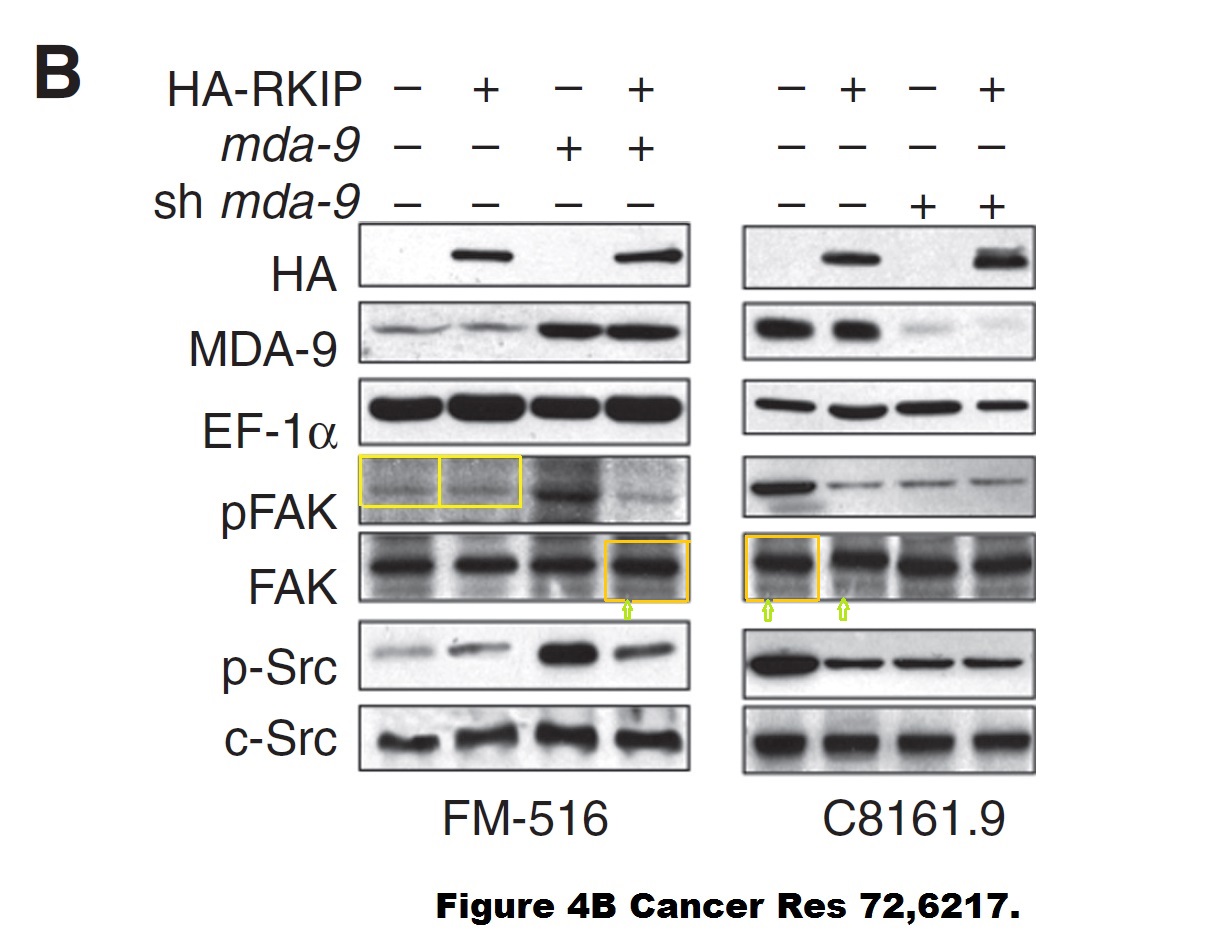
- Bhutia et al, mda-7/IL-24 differentially regulates soluble and nuclear clusterin in prostate cancer – Journal of Cellular Physiology (2012) – doi: 10.1002/jcp.22904 – PubPeer here
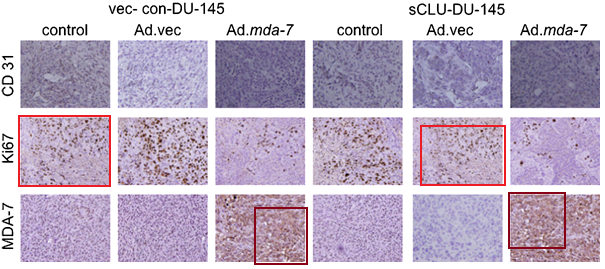
- Das et al, MDA-9/syntenin and IGFBP-2 promote angiogenesis in human melanoma – Cancer Research (2013) – doi: 10.1158/0008-5472.can-12-1681 – PubPeer here

- Bhutia et al, Targeting breast cancer-initiating/stem cells with melanoma differentiation-associated gene-7/interleukin-24 – International Journal of Cancer (2013) – doi: 10.1002/ijc.28289 – PubPeer here
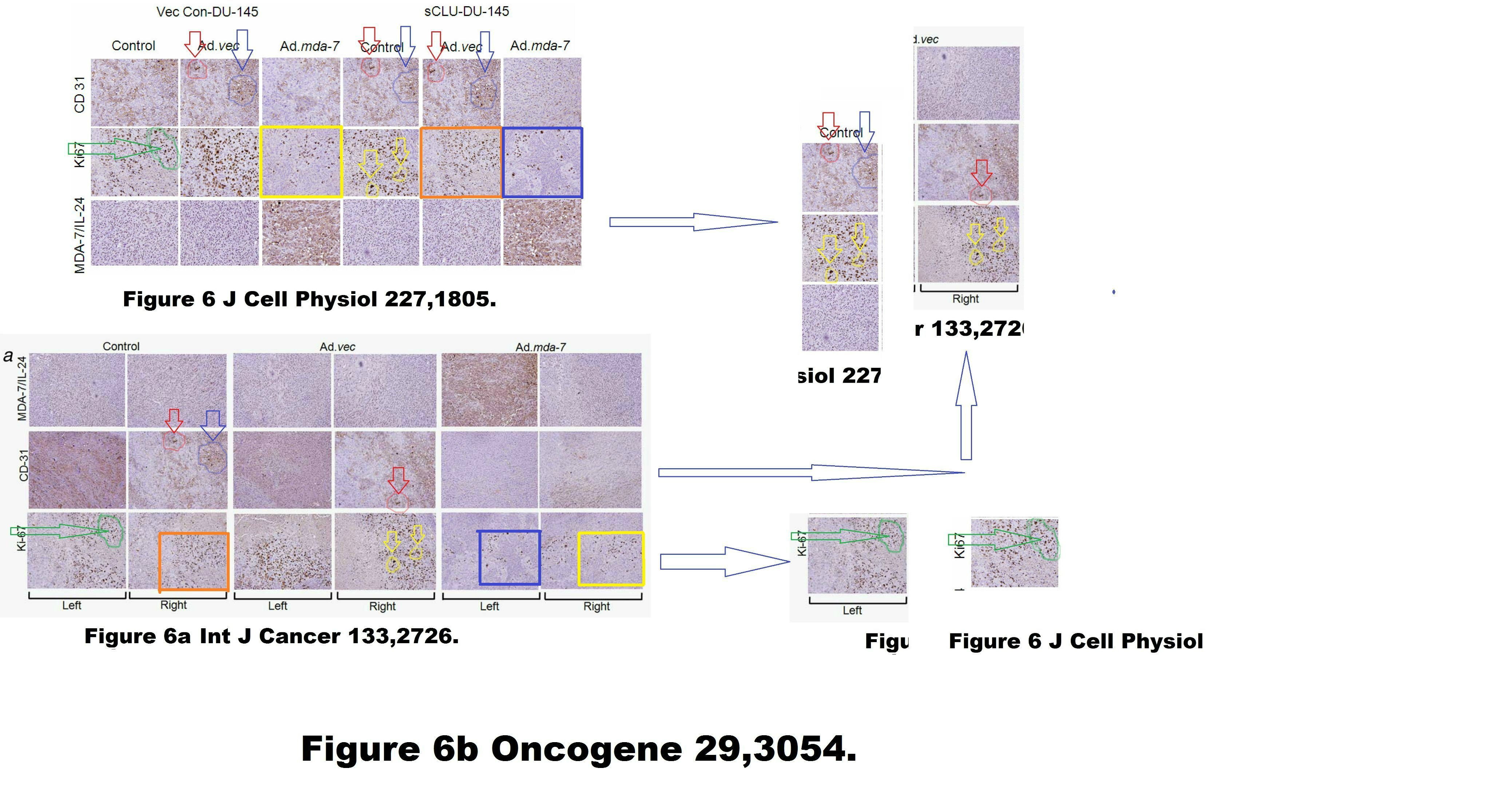
After moving back to India and taking on a faculty position, the papers with problematic images that bear Bhutia’s name appear to continue.
- Panda et al, Antitumor effect of soybean lectin mediated through reactive oxygen species-dependent pathway – Life Sciences (2014) – doi: 10.1016/j.lfs.2014.07.004 – PubPeer here
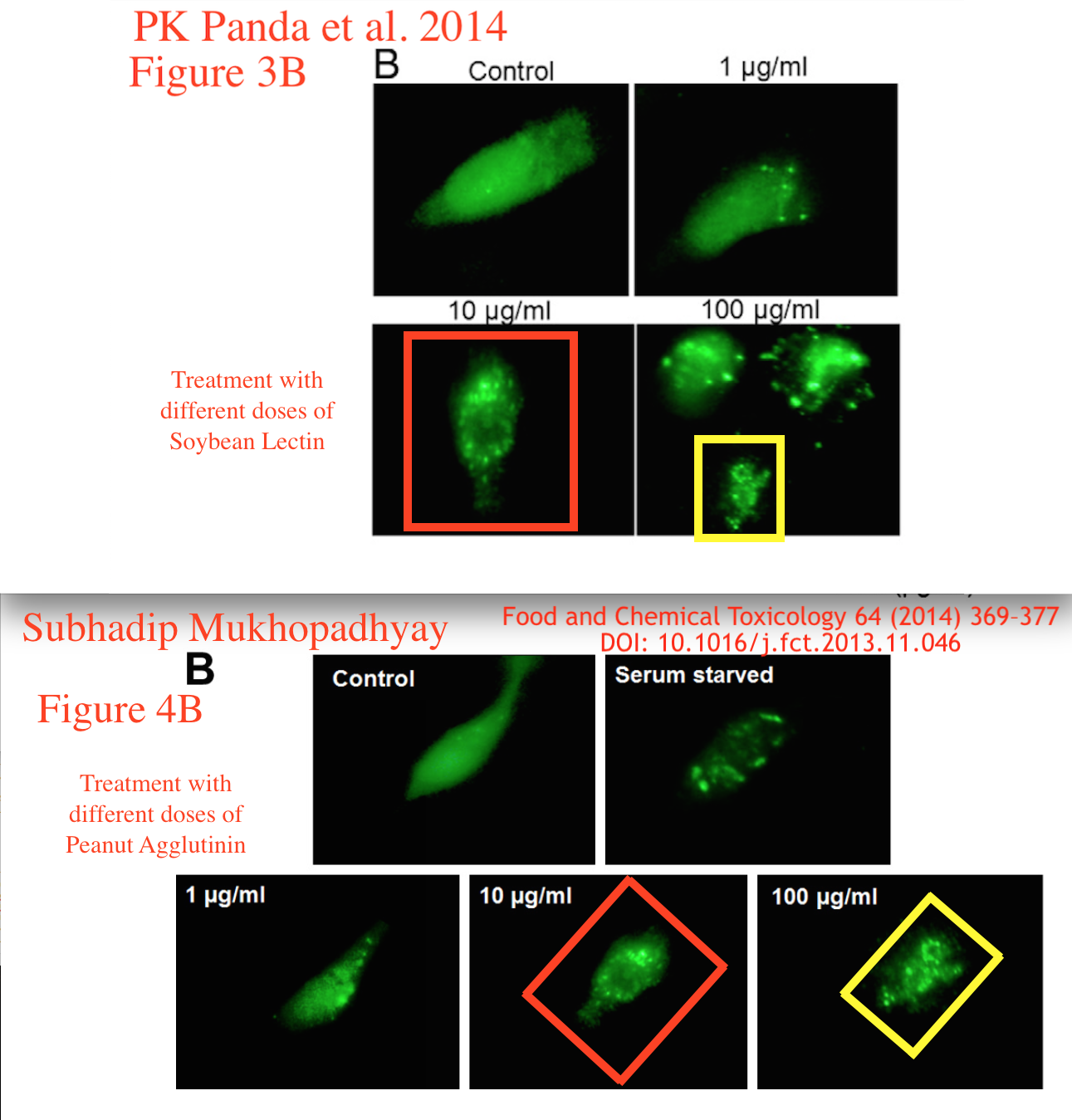
- Dash et al, Evaluation of the cell cytotoxicity and DNA/BSA binding and cleavage activity of some dioxidovanadium(V) complexes containing aroylhydrazones – Journal of Inorganic Biochemistry (2015) – doi: 10.1016/j.jinorgbio.2014.12.018 – PubPeer here
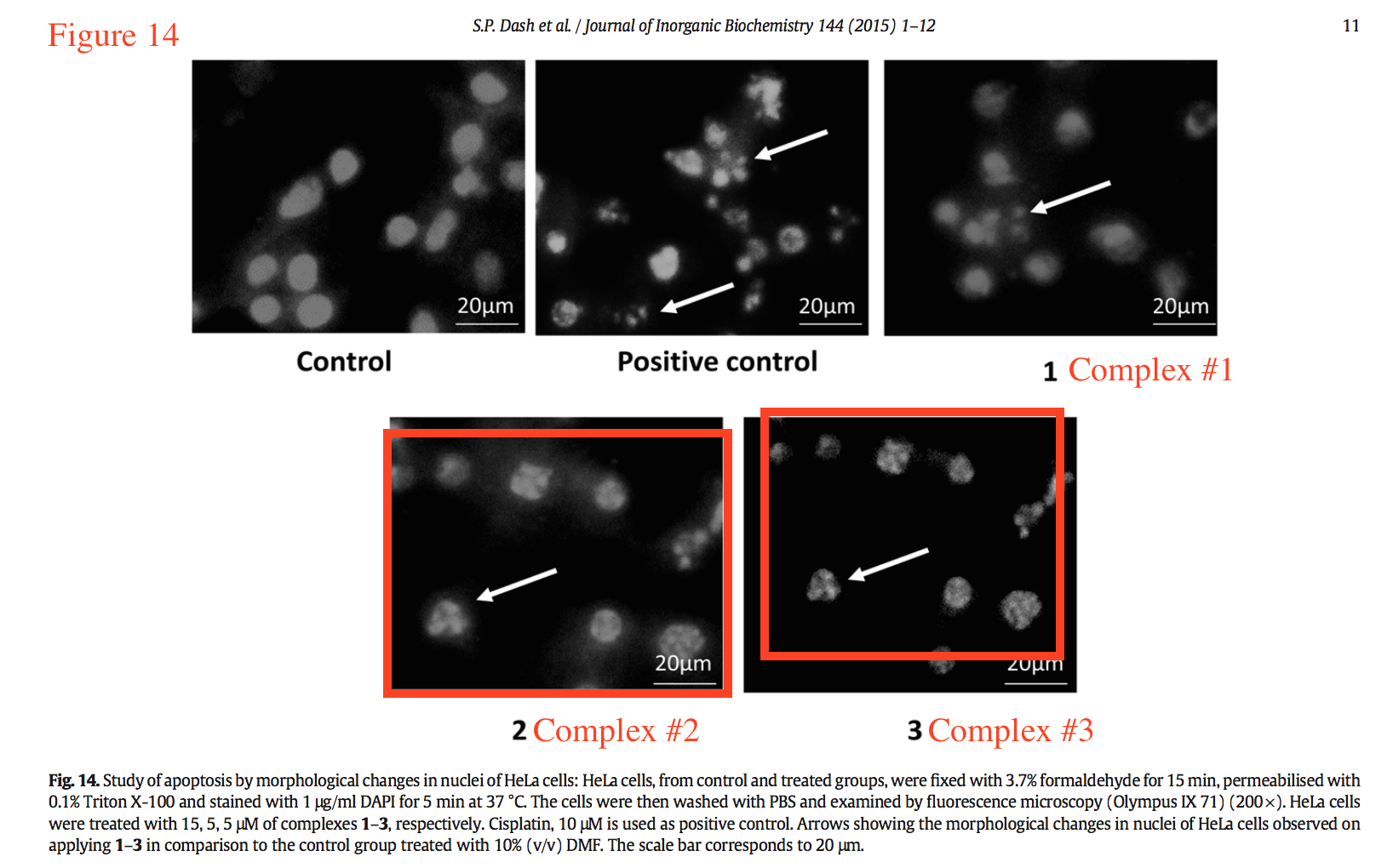
- Panda et al, Abrus Agglutinin, a type II ribosome inactivating protein inhibits Akt/PH domain to induce endoplasmic reticulum stress mediated autophagy-dependent cell death – Molecular Carcinogenesis (2017) – doi: 10.1002/mc.22502 – PubPeer here
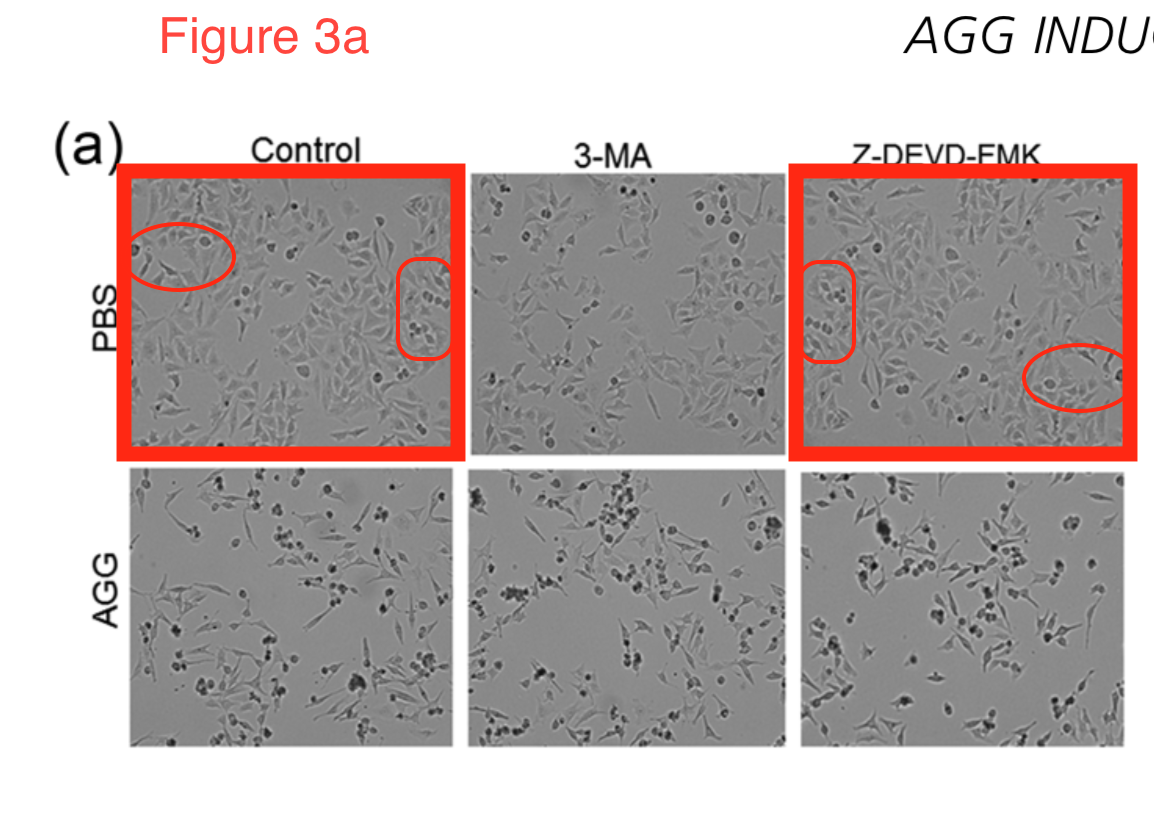
- Panda et al, PUMA dependent mitophagy by Abrus agglutinin contributes to apoptosis through ceramide generation – Biochimica et Biophysica Acta (BBA) – Molecular Cell Research (2018) – doi: 10.1016/j.bbamcr.2017.12.002 – PubPeer here

- Jazirehi et al, Inhibition of the Raf–MEK1/2–ERK1/2 Signaling Pathway, Bcl-xLDown-Regulation, and Chemosensitization of Non-Hodgkin’s Lymphoma B Cells by Rituximab – Cancer Research (2004) – doi: 10.1158/0008-5472.can-03-3500 – PubPeer here (read also here)
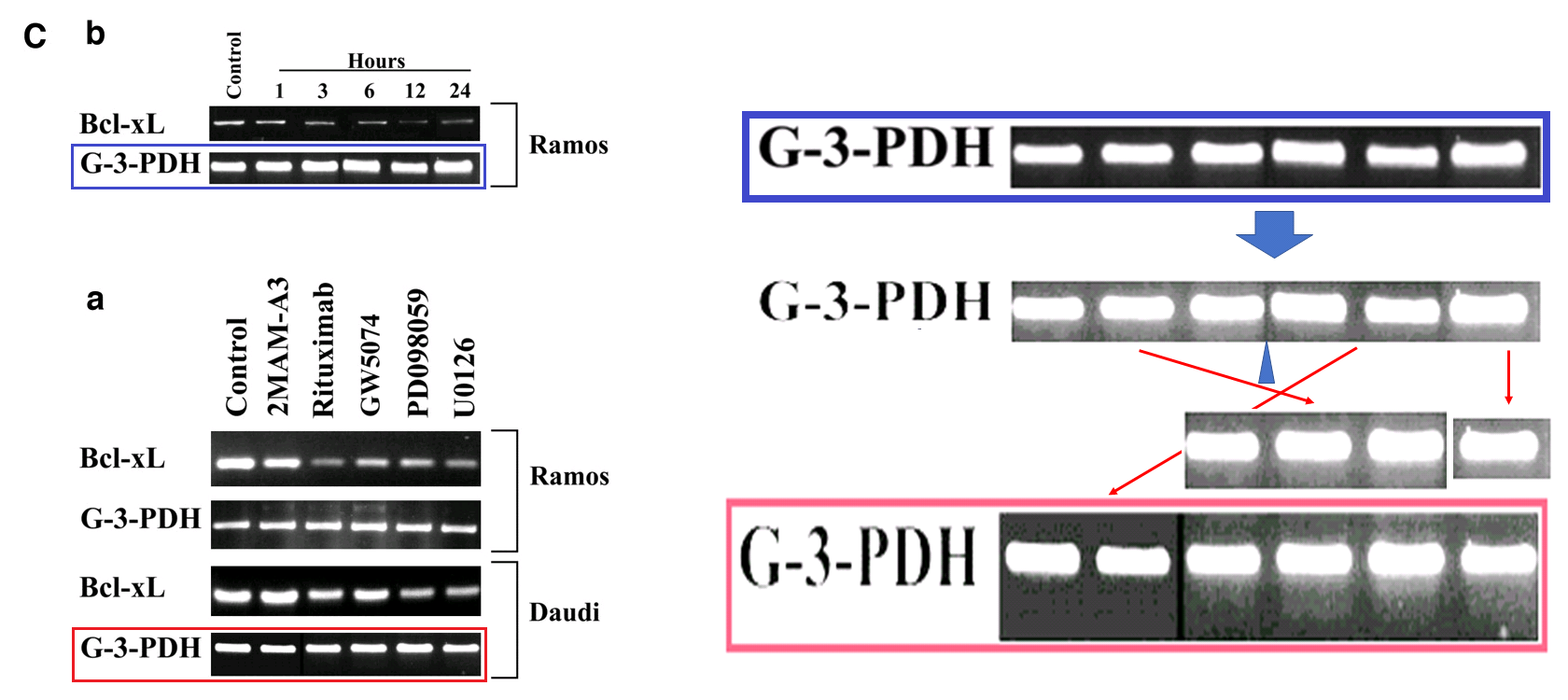
- Cross-Knorr et al, RKIP phosphorylation and STAT3 activation is inhibited by oxaliplatin and camptothecin and are associated with poor prognosis in stage II colon cancer patients – BMC Cancer (2013) – doi: 10.1186/1471-2407-13-463 – PubPeer here
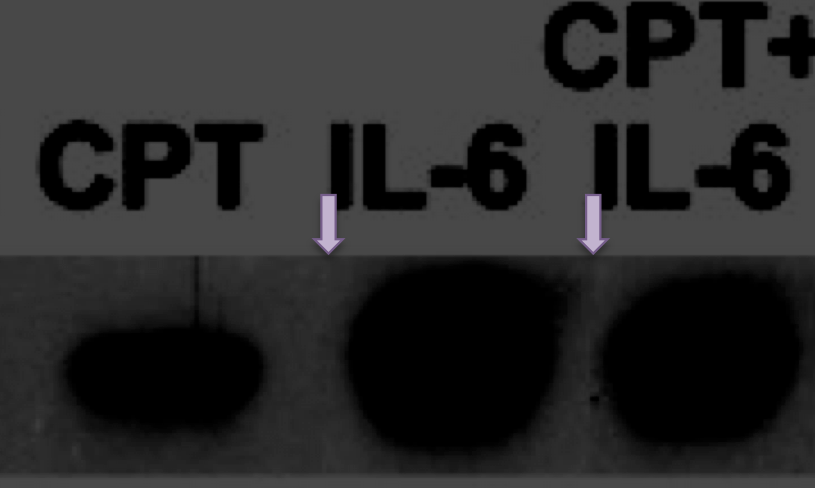
The second case of interest with a VCU connection is the work of Devasis Chatterjee. He has worked at Brown University, Providence, Rhode Island for most of his career. He did his postdoc, then became a research associate, and finally accepted a faculty position in 2001, all at Brown University. Interestingly, Chatterjee’s faculty page is not working anymore, but WaybackMachine has an archived version. Another Brown University website does list his name, and the institutional link to his CV appears to still be working.
Chatterjee has published one paper with Fisher (from VCU) and this paper is one of the ~ 40 papers flagged on PubPeer from the Fisher/Dent/Grant triad (Sujit Bhutia is also a co-author).
- Das et al, Raf kinase inhibitor RKIP inhibits MDA-9/syntenin-mediated metastasis in melanoma – Cancer Research (2012) – doi: 10.1158/0008-5472.can-12-0402 – PubPeer here

However, problems with Chatterjee’s publications are not limited to his collaboration with Fisher.
As of today he has a total of 10 papers flagged on PP. Starting in 2004, he published with Kam C. Yeung, [now at University of Toledo, Ohio, -LS] also at the Brown University, and who also has 10 flagged papers on Pubpeer (5 with Chatterjee). These 5 are:
- Yeung et al, Raf kinase inhibitor protein interacts with NF-kappaB-inducing kinase and TAK1 and inhibits NF-kappaB activation – Molecular and Cellular Biology (2001) – doi: 10.1128/mcb.21.21.7207-7217.2001 – PubPeer here
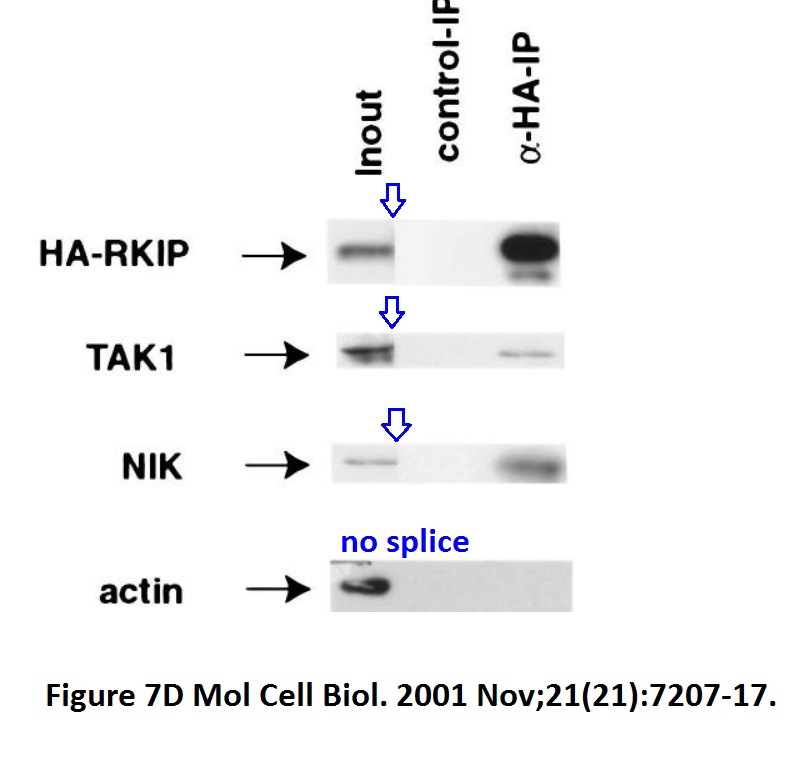
- RETRACTED: Baritaki et al, Regulation of tumor cell sensitivity to TRAIL-induced apoptosis by the metastatic suppressor Raf kinase inhibitor protein via Yin Yang 1 inhibition and death receptor 5 up-regulation – The Journal of Immunology (2007) – doi: 10.4049/jimmunol.179.8.5441 issn: 0022-1767 – PubPeer here (read also here)
- Chatterjee et al, RKIP sensitizes prostate and breast cancer cells to drug-induced apoptosis – Journal of Biological Chemistry (2004) – doi: 10.1074/jbc.m313816200 – PubPeer here
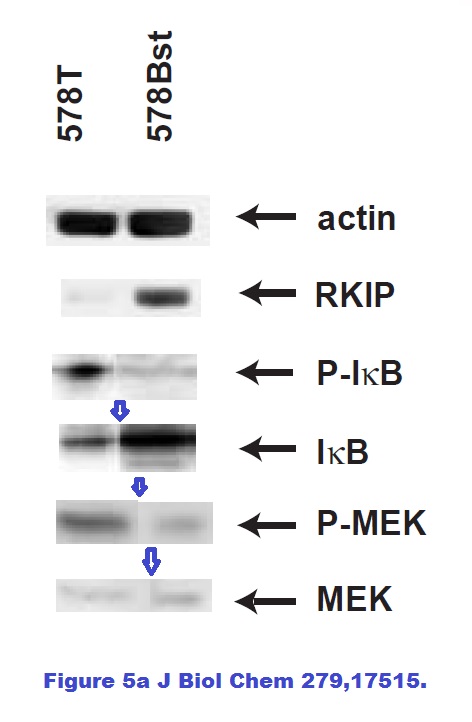
- Al Mulla et al, Clinical implications for loss or diminution of expression of Raf-1 kinase inhibitory protein and its phosphorylated form in ductal breast cancer – American journal of cancer research (2013) – pubmed: 24224123 – PubPeer here
- Yousuf et al, Raf kinase inhibitor protein (RKIP) blocks signal transducer and activator of transcription 3 (STAT3) activation in breast and prostate cancer – PLoS ONE (2014) – doi: 10.1371/journal.pone.0092478 – PubPeer here
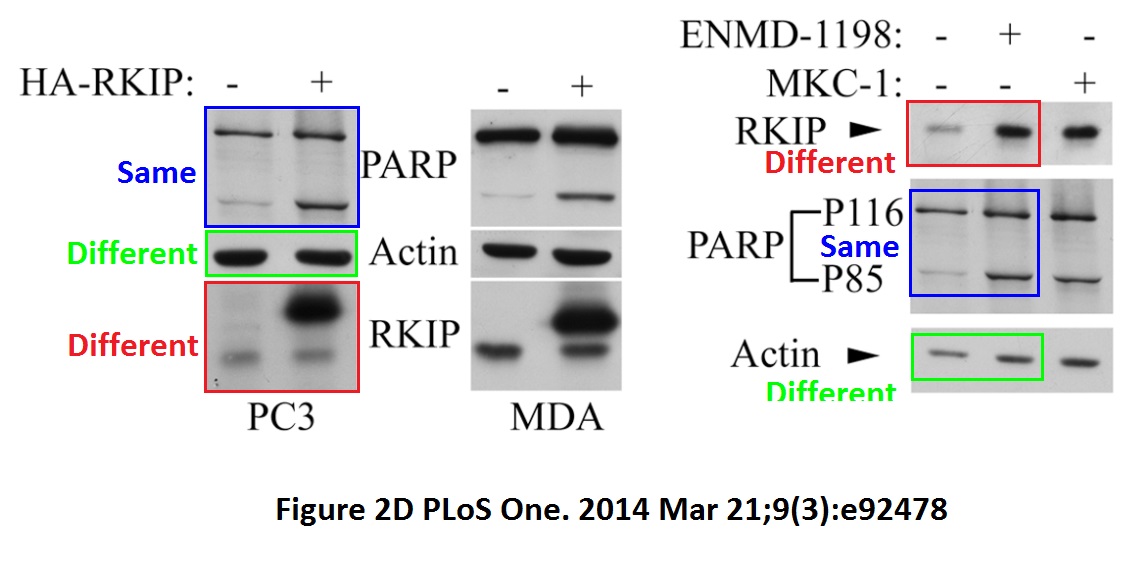
Chatterjee also collaborated with Benjamin Bonavida at UCLA who currently has 22 PubPeer entries (3 with Chatterjee) (some papers overlap with the ones mentioned above, with Yeung). The 3 papers of Chatterjee with Bonavida on PP are:
- Jazirehi et al, Inhibition of the Raf–MEK1/2–ERK1/2 Signaling Pathway, Bcl-xLDown-Regulation, and Chemosensitization of Non-Hodgkin’s Lymphoma B Cells by Rituximab – Cancer Research (2004) – doi: 10.1158/0008-5472.can-03-3500 – PubPeer here (read also here)
- RETRACTED: Baritaki et al, Regulation of tumor cell sensitivity to TRAIL-induced apoptosis by the metastatic suppressor Raf kinase inhibitor protein via Yin Yang 1 inhibition and death receptor 5 up-regulation – The Journal of Immunology (2007) – doi: 10.4049/jimmunol.179.8.5441 issn: 0022-1767 – PubPeer here (read also here)

- Yousuf et al, Raf kinase inhibitor protein (RKIP) blocks signal transducer and activator of transcription 3 (STAT3) activation in breast and prostate cancer – PLoS ONE (2014) – doi: 10.1371/journal.pone.0092478 – PubPeer here
Of note, these three PubPeer-flagged Bonavida/Chatterjee papers also bear the name of Demetrios Spandidos, founder of Spandidos Publications.
Also see: https://retractionwatch.com/2016/12/13/ucla-lab-pulls-two-papers-one-author-admitted-misconduct/
Thirdly, Chatterjee collaborated with the Italian industrial oncology researcher Claudio Pisano who was earlier involved in another flagged paper in 2008, doi: 10.1158/1535-7163.mct-08-0419. Chatterjee’s collaboration with Pisano earned them another flagged paper on PubPeer:
- Cross-Knorr et al, RKIP phosphorylation and STAT3 activation is inhibited by oxaliplatin and camptothecin and are associated with poor prognosis in stage II colon cancer patients – BMC Cancer (2013) – doi: 10.1186/1471-2407-13-463 – PubPeer here
Interestingly, three of Chatterjee’s PubPeer-flagged papers are not the result of his choice of collaborators; these three only feature Brown University authors.
- Yuan et al, Stat3 dimerization regulated by reversible acetylation of a single lysine residue – Science (2005) – doi: 10.1126/science.1105166 – PubPeer here
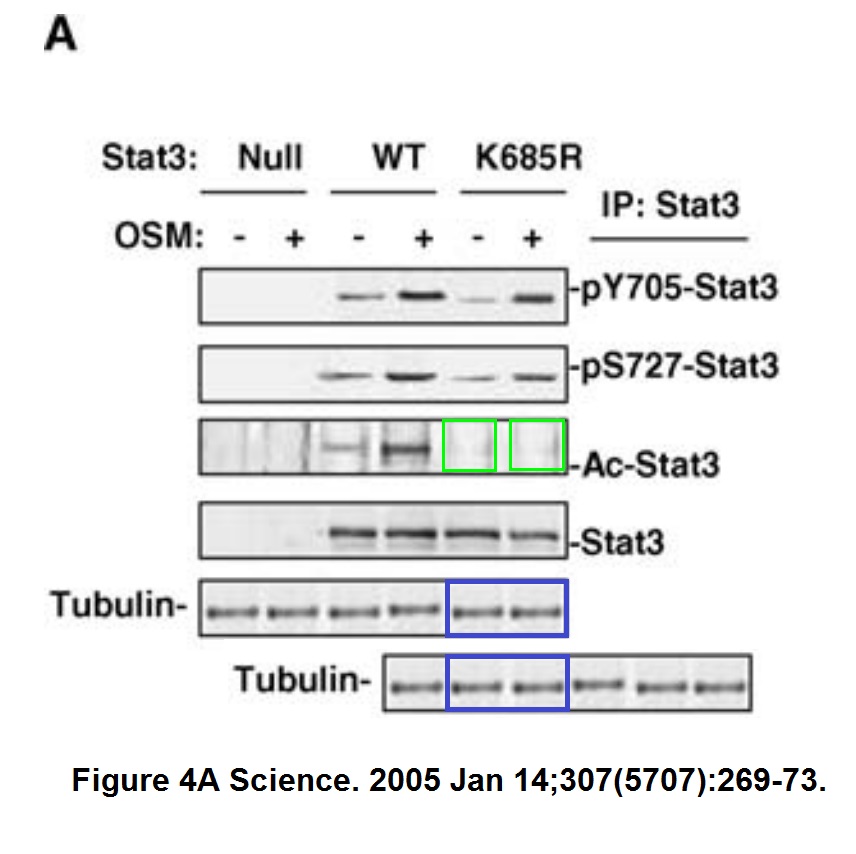
- Moen et al, Regulation of RKIP function by Helicobacter pylori in gastric cancer – PLoS ONE (2012) – doi: 10.1371/journal.pone.0037819 – PubPeer here
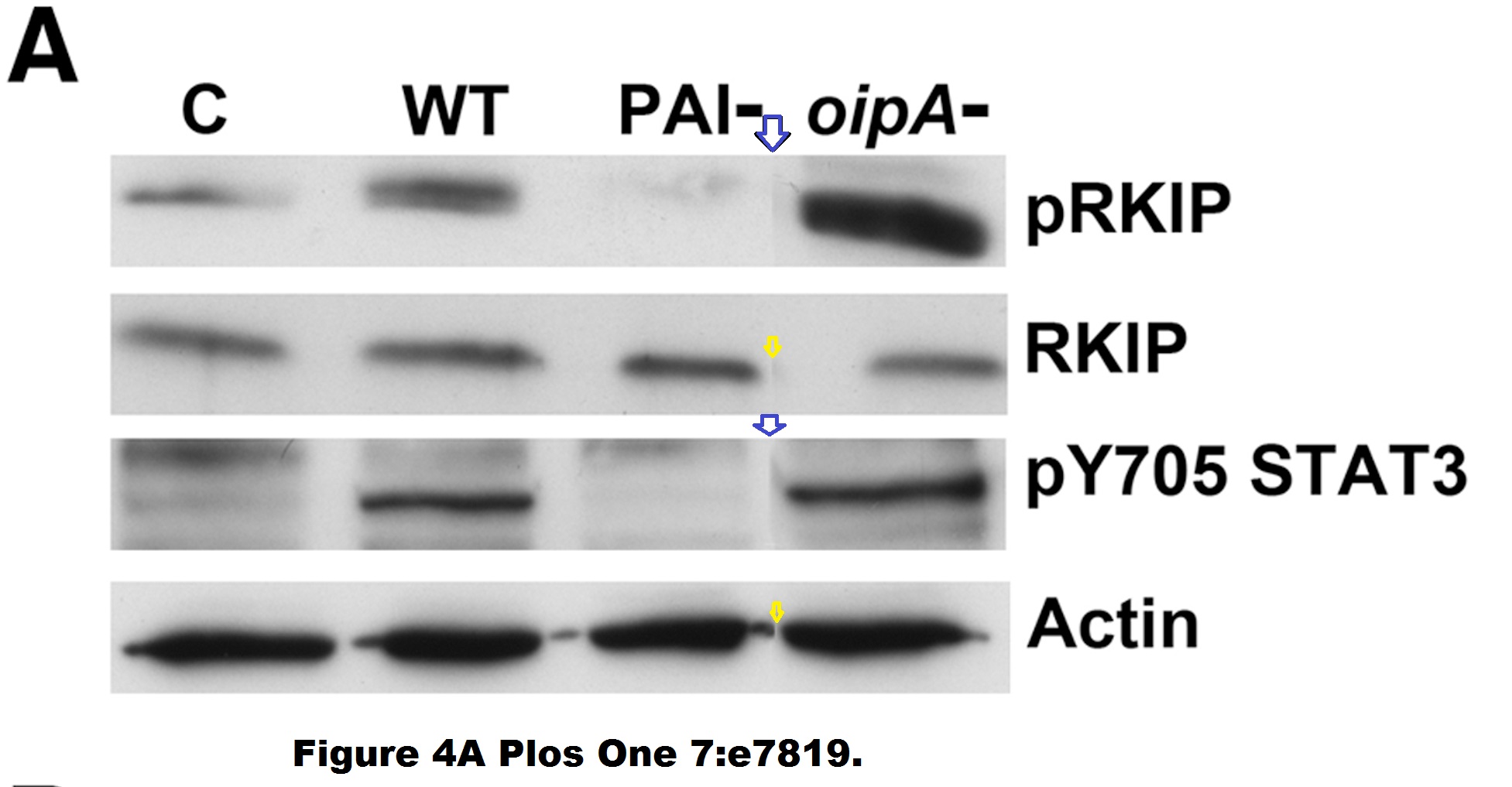
- Mulvey et al, Extracellular vesicle-mediated phenotype switching in malignant and non-malignant colon cells – BMC Cancer (2015) – doi: 10.1186/s12885-015-1568-3 – PubPeer here
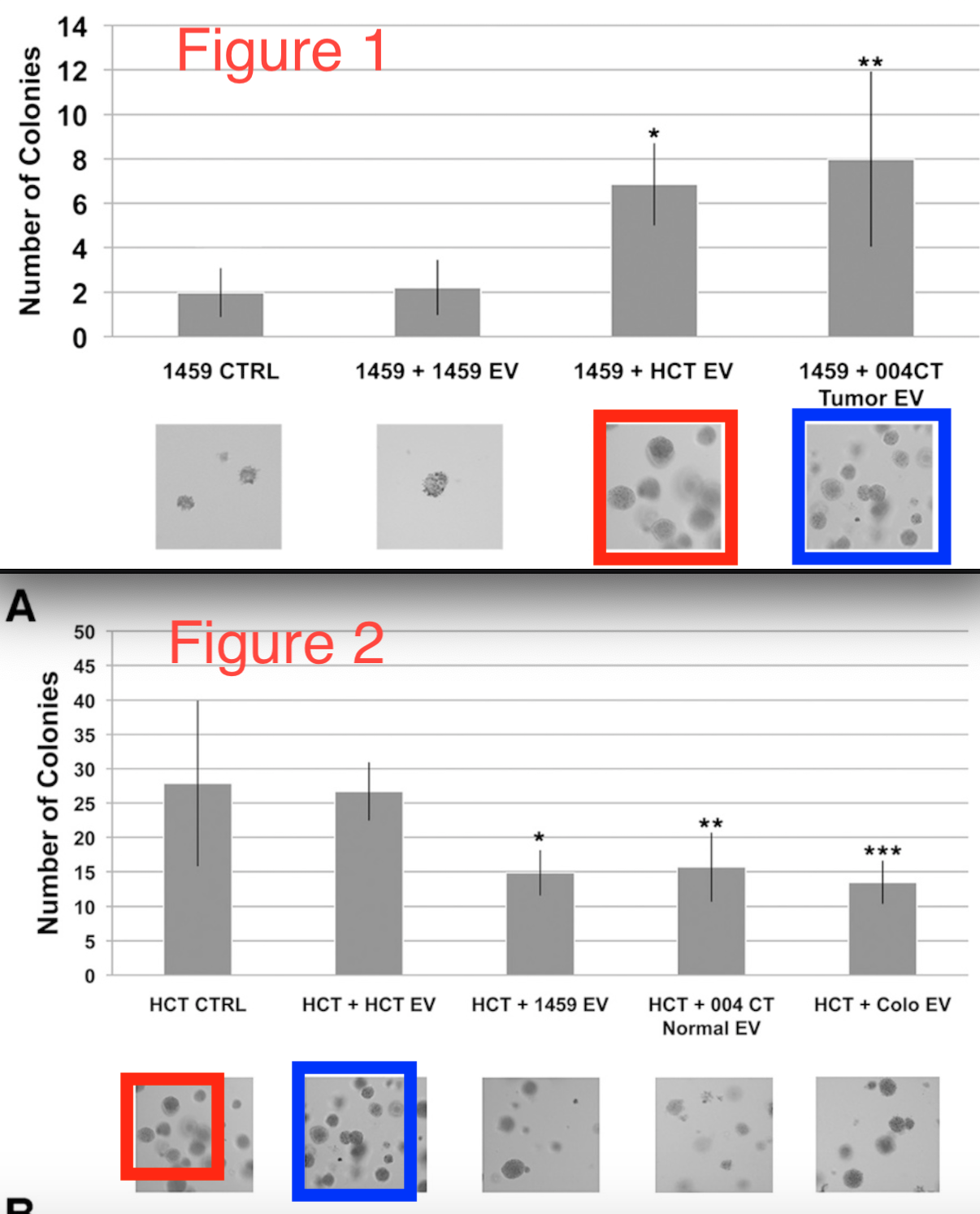

Donate!
If you are interested to support my work, you can leave here a small tip of $5. Or several of small tips, just increase the amount as you like (2x=€10; 5x=€25). Your generous patronage of my journalism will be most appreciated!
€5.00


Wow!
LikeLike
“Cleaning the stables and making room for honest cancer researchers is apparently not an option.”
Why would members the leadership team dismiss themselves?
https://www.massey.vcu.edu/about/leadership/team/
Steven Grant, M.D.
Associate director for translational research
Program co-leader of Developmental Therapeutics
Shirley Carter Olsson and Sture Gordon Olsson Chair in Cancer Research
Professor and Eminent Scholar, Hematology, Oncology and Palliative Care
(804) 828-7999
https://blog.pubpeer.com/search?q=Steven+Grant
Devanand Sarkar, M.B.B.S., Ph.D.
Associate director for education and training
Harrison Endowed Scholar in Cancer Research
Professor, Human and Molecular Genetics
(804) 827-2339
https://blog.pubpeer.com/search?q=Devanand+Sarkar
https://vimm.vcu.edu/laboratory-groups/carlo-m-croce-md/
Retractions and corrections.
http://retractiondatabase.org/RetractionSearch.aspx?AspxAutoDetectCookieSupport=1#?AspxAutoDetectCookieSupport%3d1%26auth%3dCroce%252c%2bCarlo%2bM
LikeLike
For demonstrating that Asperger people are usefulI I really thank the best independant journalist of the world (please donate or hire me).
What a breakthrough
LikeLike
She may check Western blots and incredibly small error bars in papers from J P Tuckermann´s lab. Examples here: https://www.ncbi.nlm.nih.gov/pmc/articles/PMC6145911/
https://pubpeer.com/publications/2D084E91EDC85D6C23BC63ACF5E6A8
https://pubpeer.com/publications/1C1292425188400AB6A2B0C4B6E2D0
LikeLike
Pingback: Help with another? Not on PubPeer yet – For Better Science
Pingback: Opera Buffa di Guido Kroemer a La Scala – For Better Science
Pingback: Catherine Verfaillie, the Zombie Scientist of KU Leuven – For Better Science
Pingback: Il Piccolo Mulino Verduci Frodotore – For Better Science
“Yousuf et al, Raf kinase inhibitor protein (RKIP) blocks signal transducer and activator of transcription 3 (STAT3) activation in breast and prostate cancer – PLoS ONE (2014) – doi: 10.1371/journal.pone.0092478”
Validation of criticisms in article by 2021 retraction.
Funding: This work was supported by the U.S. Army Medical Breast Cancer Research Program under Materiel Command W81XWH-07-1-0556 and W81XWH-08-1-0516 (DC).
Research reported in this publication was also supported by the National Institute of General Medical Sciences of the National Institutes of Health under Award Number P20GM103421.
The previous segment of this project was supported by the National Center for Research Resources (NCRR) under P20 RR 017695 (DC) and 1R01 CA102128-01A2 (EC).
2021 retraction. Note: Benjamin Bonavida as co-author.
PLoS One. 2014 Mar 21;9(3):e92478. doi: 10.1371/journal.pone.0092478. eCollection 2014.
Raf kinase inhibitor protein (RKIP) blocks signal transducer and activator of transcription 3 (STAT3) activation in breast and prostate cancer
Saad Yousuf 1, MeiLi Duan 2, Erika L Moen 1, Sam Cross-Knorr 1, Kate Brilliant 1, Benjamin Bonavida 3, Theresa LaValle 4, Kam C Yeung 5, Fahd Al-Mulla 6, Eugene Chin 7, Devasis Chatterjee 1
Affiliations
1Department of Medicine, Rhode Island Hospital and The Alpert Medical School of Brown University, Providence, Rhode Island, United States of America.
2Department of Medicine, Rhode Island Hospital and The Alpert Medical School of Brown University, Providence, Rhode Island, United States of America; Department of Critical Care Medicine, Beijing Friendship Hospital, Capital Medical University, Beijing, China.
3Department of Microbiology, Immunology and Molecular Genetics, University of California Los Angeles, Los Angeles, California, United States of America.
4Kolltan Pharmaceuticals, Inc., New Haven, Connecticut, United States of America.5Department of Biochemistry and Cancer Biology, University of Toledo, College of Medicine, Toledo, Ohio, United States of America.
6Department of Pathology, Faculty of Medicine, Kuwait University, Safat, Kuwait.
7Department of Surgical Research, Rhode Island Hospital and The Alpert Medical School of Brown University, Providence, Rhode Island, United States of America.PMID: 24658061 PMCID: PMC3962420 DOI: 10.1371/journal.pone.0092478
RETRACTION.
Retraction: Raf Kinase Inhibitor Protein (RKIP) Blocks Signal Transducer and Activator of Transcription 3 (STAT3) Activation in Breast and Prostate Cancer (plos.org)
Following the publication of this article [1], concerns were raised regarding results presented in Figs 1, 2, and 4.
Specifically,
Vertical irregularities suggestive of splice lines were detected in the following panels:○. Fig 1D, RKIP panel, between lanes 2 and 3.○.
Fig 2A DU145 RKIP panel, between lanes 1 and 2, as well as between lanes 2 and 3.○. Fig 2A PC3 RKIP panel, between lanes 1 and 2, as well as between lanes 2 and 3.
In Fig 2D, the PC3 PARP panel appears similar to the first two lanes of the right (DU145) panel, despite representing results obtained from different cell lines.In Fig 4A, the following similarities were detected between lanes presented in the middle panel and lanes presented in the right panel:○.
The first two lanes of the middle pY705 STAT3 panel appear similar to the first two lanes of the right pY705 STAT 3 panel. However, the corresponding Actin panel results for these lanes do not appear to match.○.
Lanes 3 and 4 in the middle panel appear similar to lanes 7 and 8 in the middle panel respectively, despite being used to represent different experimental conditions.○.
The last lane of the middle pY705 STAT3 panel appears similar to the last lane of the right pY705 STAT3 panel, despite being used to represent different experimental conditions.
The authors have not provided the original images underlying the panels of concern.In light of the concerns affecting multiple figure panels that question the integrity of the data, the PLOS ONE Editors retract this article.ELM agreed with the retraction and apologises for the issues with the published article. BB did not agree with the retraction. SY, MD, SC-K, KB, TL, KCY, FA-M, EC, and DC either did not respond directly or could not be reached.
Reference1.Yousuf S, Duan M, Moen EL, Cross-Knorr S, Brilliant K, Bonavida B, et al. (2014) Raf Kinase Inhibitor Protein (RKIP) Blocks Signal Transducer and Activator of Transcription 3 (STAT3) Activation in Breast and Prostate Cancer. PLoS ONE 9(3): e92478. https://doi.org/10.1371/journal.pone.0092478 pmid:24658061
LikeLike